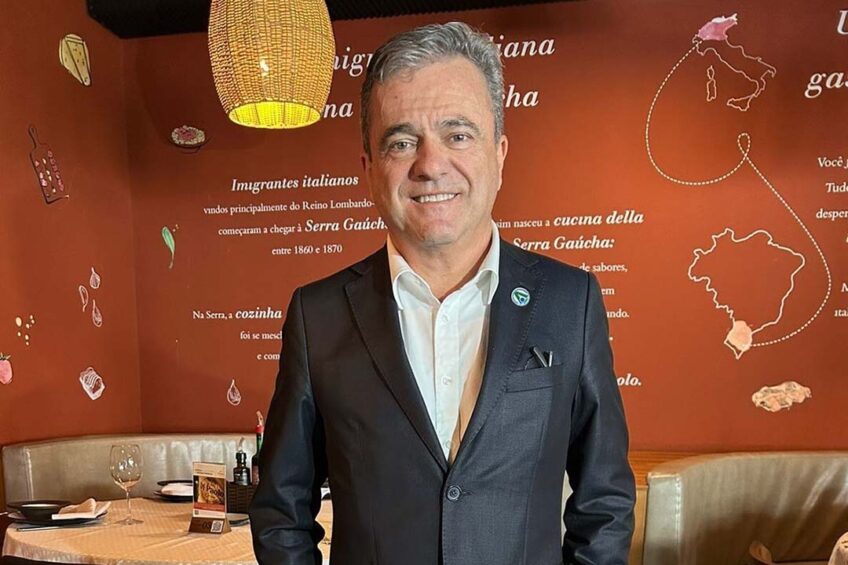Bird flu: How can the poultry sector ensure global supply?

Global poultry farming faces one of the biggest challenges in its history due to a prolonged and widespread avian influenza pandemic. Ricardo Santin, president of ABPA, took over the International Poultry Council in the face of this challenge. We asked for his thoughts…
Avian influenza has already decimated hundreds of flocks worldwide, generated trading barriers, and, therefore, threatens the global supply of one of the most accessible proteins.
Ricardo Santin recently assumed the presidency of the International Poultry Council with the challenge of guaranteeing the international supply of poultry products. The executive is a well known reference in the sector in Brazil and also holds the position of president of the Brazilian Animal Protein Association (ABPA), where he has worked since its foundation.
Perhaps the success of the national poultry industry also helped lead Santin to the leadership of the International Poultry Council. Brazil is already the second-largest producer and largest poultry exporter and has never recorded cases of the disease on commercial farms.
Poultry World spoke to Santin to find out more…
Santin, what is it like to be the first Brazilian to preside over the International Poultry Council?
It is a great honor to be there at the International Poultry Council representing the global poultry industry, which is the second most consumed protein in the world. Everyone already knows that, according to FAO and USDA projections, chicken will be the most consumed protein shortly as it is one of the most accessible.
Being there with 27 countries and 50 of the largest industries in the sector, which represent 80% of production, is an honor and a great responsibility. Especially for continuing the good work that was done by Robin Horel and Jim Sumner, one from the US and the other from Canada, who preceded me.
The objective is to strengthen the institution, and to reinforce its presence as the voice of the poultry industry in the world.
What does it mean to keep up the good work?
We managed to build virtual working groups, in addition to holding an annual meeting that this year will be in Argentina from 6-8 May. In these working groups, we are comunicating about trading, the responsible use of antimicrobials, and topics that are common to the sector all over the world.
Debates cross borders with everyone focused on improving production. For example, the issue of avian influenza banned the trade in genetics. That is my priority: moving forward with regional compartmentalisation to ensure that the poultry industry around the globe does not run out of genetic material.
What are your other priorities?
The first is to strengthen the image of the International Poultry Council and, later on, attract more members. We will try to seek out more member countries and companies, as well strengthen the International Poultry Council’s presence with local governments.
The International Poultry Council manages to find an average of expectations amongst its members, organising events and, sometimes, taking action all over entire world. We need to have strength with governments.
Some examples are the positions on avian influenza or the case study on the prudential use of antimicrobials. That study has been practically adopted as standard because we have speaking positions within the World Organization for Animal Health and the Food and Agriculture Organization of the United Nations.
Extraordinary situations may require outstanding measures. What more can be done to combat avian influenza and ensure healthy poultry meat for the entire planet?
First, avian influence does not transfer to meat, so the meat remains healthy. But many countries still block international commerce due to the precautionary principle.
The second point is to ensure that the world learns to live with this virus. Following technical recommendations, it means segregating only the regions where the disease is present to guarantee supply to all parts of the world. That’s what we want to do with the practically. Let’s work so that there is no trade interruption, maintaining people’s food security.
How is the acceptance of compartmentalisation by regions?
Brazil recognises compartmentalisation in France, Canada, and the US on genetic material, for example. We have reciprocity under OMSA compartment rules. That is why we continue to import genetic material even from countries that have had a case of bird flu in their commercial production.
France, for example, exports egg-laying genetic material to Brazil, but has had cases in wild birds in the north. There’s no reason for us to block it. We must build a vision of solidarity and complementarity amongst countries. The world cannot have borders for food. I have this saying.
Japan had blocked exports from Brazilian Espírito Santo state and reopened. What happened?
Countries are accepting this type of compartmentalisation. In the case of Japan, we had a case of bird flu in a backyard production in the state of Espírito Santo. Japan understood that it is the same as a wild bird case. In other words, trade no longer closes.
In the case of Brazil, we are already working with many markets. More than half of those who import Brazilian products have already recognised the possibility of a zone or compartment with a radius of 10 km.
Can the sector help mitigate the risk, also for backyard production?
The entire sector already helps through training people in regions where companies are. We have cases where companies called their neighbours and provided materials or helped to build small and closed aviaries. Ideally, every producer should have at least sources of treated water, not lakes, for example. That’s what we’re doing: training campaigns to try to prevent it.
Why did other countries have the problem in wild birds first and then in commercial farms and Brazil did not?
It is due to several factors, but the first is very high biosecurity work in the farm environment. In addition, very high dietary care is pivotal.
The third point is that Brazil has bird migration mainly in coastal areas, where there is no significant production. In other words, international migration routes do not bypass our production areas. They are far from production.
The last reason, and perhaps the most important, is that we don’t collect water in open places. Our poultry houses always receive treated water. That eliminates the risk of sick wild birds coming to a pond and livestock using that water. It’s a simple thing, but it’s a great transmission vector. We already did this naturally as a standard before the outbreaks.
In addition, Brazil adopts the total ban on visits to farms and strengthening the training of employees with simple measures such as washing hands and changing clothes.













